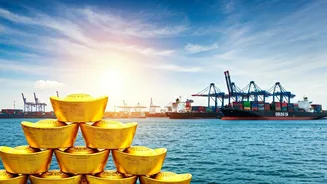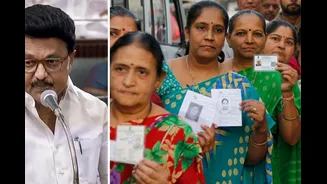Festive Demand Boost
The Union Finance Minister, Nirmala Sitharaman, reported that the Goods and Services Tax (GST) reforms have substantially contributed to the exceptional
demand seen during the festive season. This surge reflects the effectiveness of the government's economic policies, which have fostered positive sentiment and boosted consumer spending. The GST reforms have streamlined tax processes, encouraging greater compliance and facilitating trade, thereby enhancing economic activity across various sectors. The increased demand witnessed during the festive period is a key indicator of economic growth and stability. This positive trend underscores the resilience of the Indian economy and the effectiveness of fiscal measures in stimulating consumer confidence and overall prosperity. The reforms have also supported businesses in managing their operations and improving profitability, which, in turn, boosts economic growth. Additionally, the ease of doing business facilitated by GST has played a significant role in attracting investment and promoting trade. Consequently, the increased revenue from GST is further enabling the government to invest in infrastructure development, which is essential for long-term economic growth.
Mineral Sector Reforms
The government is proactively working on a range of initiatives to boost the mineral sector, with a primary focus on expediting the operational aspects of auctioned mineral blocks. Timelines have been established to accelerate the process, aiming to streamline operations and ensure timely commencement of projects. Moreover, the government has introduced the first State Mining Index to foster reforms in this crucial sector. This index will facilitate the assessment and comparison of state mining practices, thereby promoting healthy competition and encouraging best practices. The Ministry of Mines is unlikely to impose a cap on bid premiums in the upcoming auctions for critical minerals. This approach is intended to encourage robust participation and competitive bidding. Furthermore, the government is taking measures to intensify advanced-level exploration of critical mineral blocks, which will significantly bolster the domestic supply chain. These efforts demonstrate the government's commitment to self-reliance in the mineral sector. The efficient functioning of the mineral sector is vital to ensure that strategic industries and economic activities have a consistent supply of essential resources. These reforms are a critical element of India's broader economic strategy and will aid in fostering sustained growth and development.
Export Performance Analysis
India's export landscape presents a mixed picture. While exports to the United States have decreased, India has shown significant strength in non-US markets. This indicates a strategic diversification in trade relationships and reduces reliance on a single market. The government anticipates positive export growth in the current financial year. According to Piyush Goyal, the Ministry of Commerce and Industry is actively working on steps to improve the rare earth supply chain. This is a strategic move to ensure the nation has access to critical materials needed for advanced industries. The government also continues discussions regarding a potential trade deal with the United States. Although there may not be significant discrepancies between the two sides, it is essential to bridge any gaps and establish a mutually advantageous agreement. The efforts to boost exports include diversifying into new markets and supporting exporters. This strategy promotes resilience by reducing the vulnerabilities associated with market fluctuations. Additionally, the government's focus on boosting the rare earth supply chain is vital for securing access to vital resources. These efforts collectively will contribute to economic stability.



















